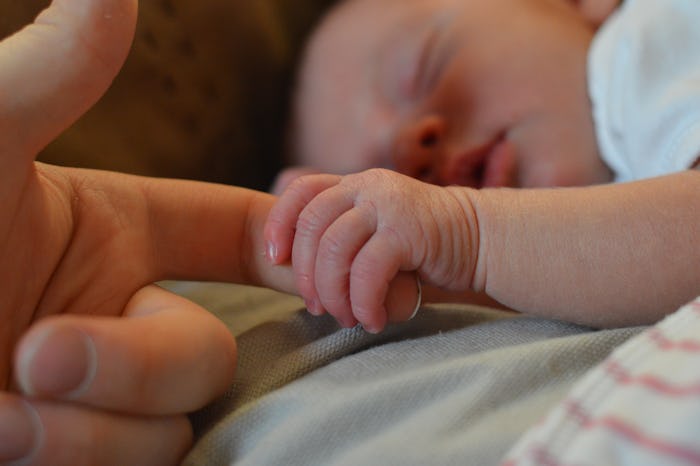Crowdfunding sites routinely help the fresh-faced entrepreneurs of America and the world raise the cash to launch their music careers, pursue their aspirations as inventors, or write the books that have long smoldered inside them. More often, though, mini-philanthropists contribute to campaigns to cover funeral costs, medical bills, or to get essential education materials into impoverished schools — endeavors that are at once desperately needed but often wildly expensive. Just like taking time off work after having a child in the United States. Now, a brand new crowdfunding site helps working moms with unpaid maternity leave, because taking a hiatus from regular paychecks while caring for a newborn is an unthinkable financial burden for many families.
Margi Scott, a Minnesota mother of four, came up with the idea for what would become MyTake12.com when her own twins were born premature and spent weeks in the NICU, all while the clock on their mom's allotted 12 weeks of unpaid maternity leave ticked down, according to local NBC affiliate KARE 11. Scott could hardly fathom returning to her job as sales manager during this tumultuous time, but she is her family's primary breadwinner — and, of course, the United States is the only nation in the developed world that offers exactly zero weeks, days, hours, and seconds of paid maternity leave.
The solution, which Scott describes as "crowdfunding meets baby registry," struck her as intuitive, if also frustratingly necessary in a country where only 12 percent of workers in the private sector had access to paid family leave through their employers in 2015, according to the U.S. Department of Labor. So, the website attempts to fill that glaring chasm by helping families to raise the funds to make it financially realistic for mothers to actually claim the 12 weeks of unpaid maternity leave afforded to many of them through the Family and Medical Leave Act.
"Taking 12 weeks of unpaid leave is not realistic for most people," Scott told KARE 11. "The issue then results in women going to work much sooner than they should, and it really creates a physical, emotional, mental, and financial stress on young families."
It's an innovative solution to a problem that those who aren't growing their families may not realize exists in the richest country in the world. And the idea of asking friends and family to chip in to cover the costs of taking that precious at home with a newborn is resonating with some. Nikia Slaughter, whose fifth child is due on Valentine's Day, wrote on her Take 12 registry page that she has no choice but to go back to work a mere two weeks before giving birth — unless she's able to raise her goal of $1,000 to literally buy herself some time:
In a perfect world, I would love to take a full year off of working like I did with my oldest son, and my youngest son, but that is not the case. My family can not take that blow to our income if I was to so called "selfishly" relish in the newborn much needed bonding time all mothers dream about their entire pregnancies day in and day out. I wish I could take even 4 weeks to bond. I love being the provider I am, and would not change that aspect. But if I had the oppertunity [sic] to qualify for paid maternity leave through my job- it would be comparable to winning the lottery.
Eventually, Take 12 aims to expand to allows fathers to request funds to spend time at home after welcoming a new baby into the family — because that's incredibly important, too. That recognition is in contrast with President-elect Donald Trump's proposed child care plan, which would allow for six weeks of paid leave for moms, but nothing for dads.
Ideally, Take 12 will be totally unnecessary for either mothers or fathers one day soon, as the federal governments works to make reasonable paid family leave a reality. In the meantime, it's an essential tool.
